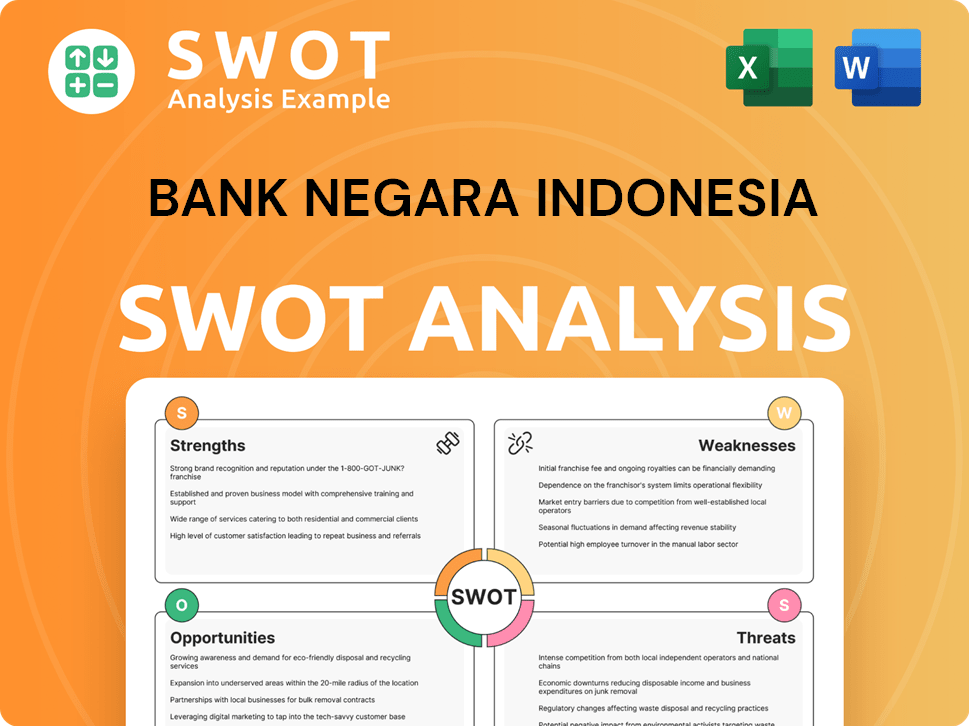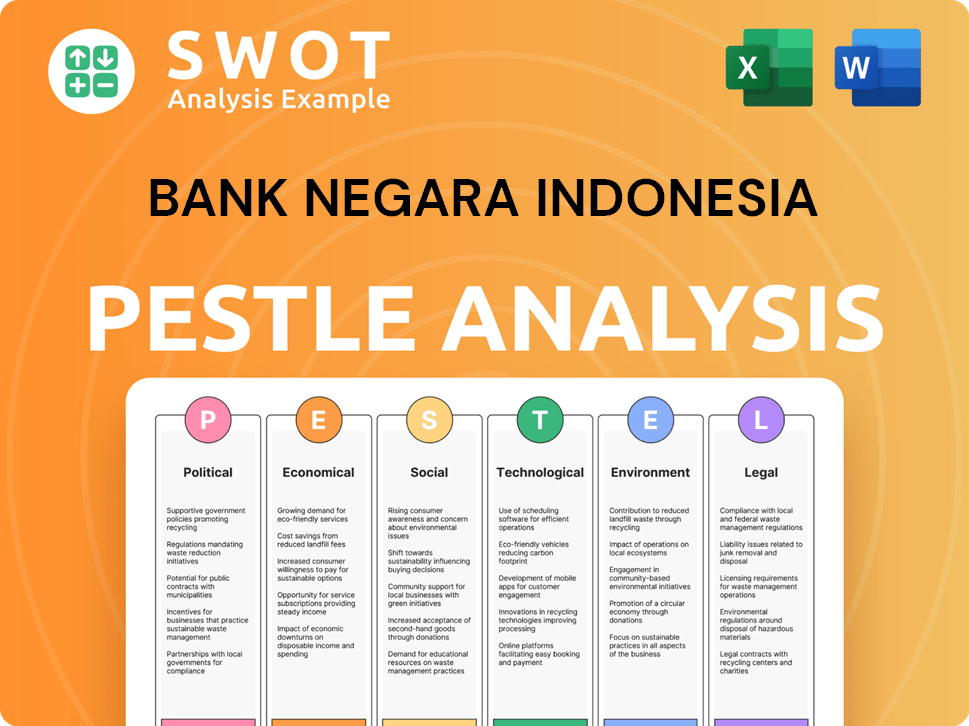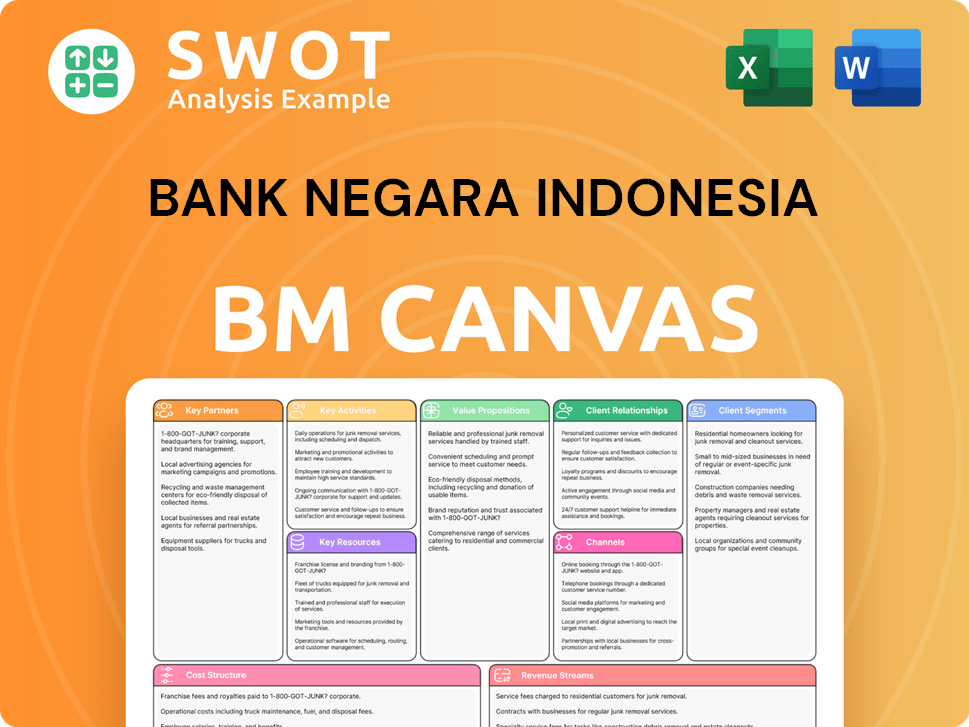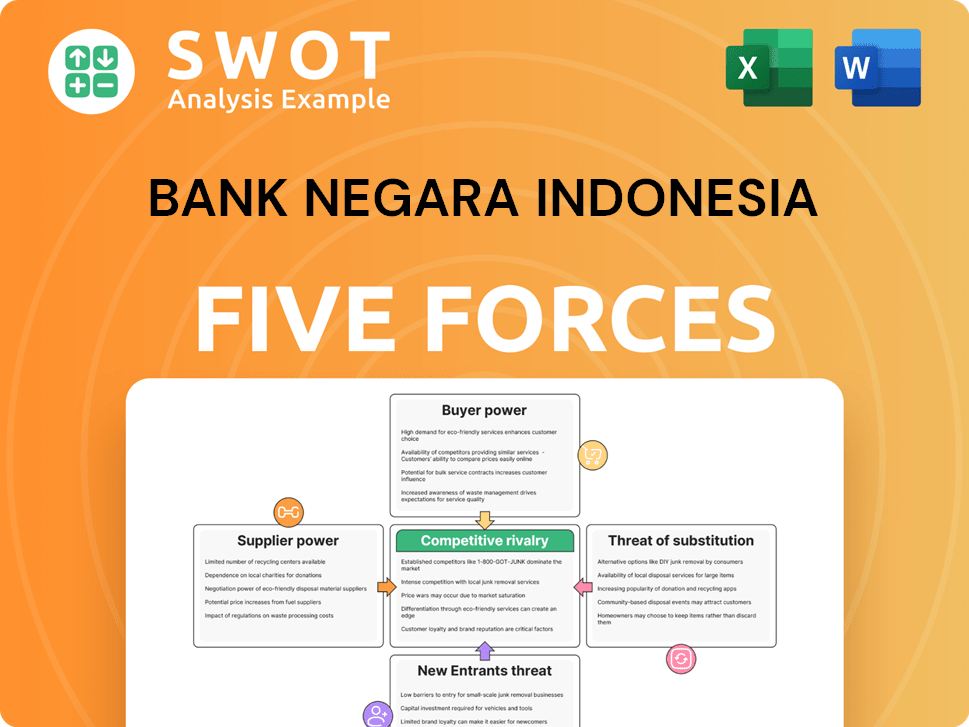Bank Negara Indonesia Bundle
How Does Bank Negara Indonesia Navigate Indonesia's Banking Battleground?
The Indonesian banking sector is a dynamic arena, constantly reshaped by digital advancements and evolving consumer expectations. Bank Negara Indonesia (BNI), a prominent state-owned entity, is a key player in this environment. Understanding the Bank Negara Indonesia SWOT Analysis is crucial for grasping its position.

This exploration dives deep into the BNI competitive landscape, examining its rivals and the forces shaping its future. We'll analyze BNI's strategic initiatives, financial performance, and market position within the Indonesian banking sector, providing a comprehensive market analysis. Discover who BNI's main rivals are and how it stacks up against them in this competitive financial services industry.
Where Does Bank Negara Indonesia’ Stand in the Current Market?
Bank Negara Indonesia (BNI) is a significant player in the Indonesian banking sector. As of December 2024, BNI's total assets reached IDR 1,087 trillion, demonstrating its substantial size and influence within the financial services industry. BNI offers a wide array of services, catering to individuals, businesses, and institutions, solidifying its position in the market.
BNI's financial performance reflects its strong market position. In 2024, the bank's net profit reached IDR 21.5 trillion, up from IDR 20.9 trillion the previous year. This growth indicates BNI's ability to maintain profitability and adapt to the evolving Marketing Strategy of Bank Negara Indonesia.
BNI's core operations include deposit accounts, loans, credit cards, investment products, and international banking services. The bank operates through an extensive network of branches, ATMs, and online platforms. BNI's focus is on providing comprehensive financial solutions to a diverse customer base, supported by a strong digital presence.
BNI offers a value proposition centered on financial stability, a wide range of services, and extensive accessibility. The bank emphasizes digital transformation to enhance customer experience and operational efficiency. BNI's focus on consumer and corporate segments, coupled with its international presence, strengthens its value proposition.
BNI holds a significant market share in several key areas. As of September 2024, BNI held a 14.67% market share in trade finance and a 19.65% market share in domestic bank guarantees. BNI's strategic focus includes expanding its digital services and strengthening its consumer and corporate segments to maintain its competitive edge.
- BNI is the fourth largest player in trade finance.
- BNI is the second largest in bank guarantees.
- Consumer credit grew by 14.6% year-on-year in 2024.
- Corporate credit increased by 15.1% year-on-year, as of 2024.
Bank Negara Indonesia SWOT Analysis
- Complete SWOT Breakdown
- Fully Customizable
- Editable in Excel & Word
- Professional Formatting
- Investor-Ready Format

Who Are the Main Competitors Challenging Bank Negara Indonesia?
The competitive landscape for Bank Negara Indonesia (BNI) within the Indonesian banking sector is shaped by a mix of state-owned and private financial institutions. This dynamic environment demands continuous adaptation and strategic innovation to maintain and enhance market share. Understanding the strengths and strategies of key rivals is crucial for BNI to effectively compete and capitalize on opportunities.
The BNI competitive landscape is largely determined by the 'Big Four' banks in Indonesia. These banks, including Bank Mandiri, Bank Rakyat Indonesia (BRI), and Bank Central Asia (BCA), collectively command a significant portion of the market's assets. Their performance and strategic initiatives directly influence the competitive dynamics, setting benchmarks for growth, digital adoption, and customer service.
BNI faces competition from various entities in the financial services industry. The following section details the main competitors and their strategies.
Bank Mandiri is a major competitor, demonstrating strong growth. In 2024, Bank Mandiri's loan growth reached 19.5% year-on-year, outpacing the industry average. Its market share increased to 19.5% from 18.5% in December 2023. Bank Mandiri's wholesale business and digital platforms strengthen its funding base.
BCA is a formidable rival, known for its resilience. BCA leads in fund transfers, international remittances, credit cards, and investment products. It excels in branch banking and social media presence. BCA is recognized as the most recommended retail bank in Indonesia, with a 71% BankQuality score.
BRI is a dominant player, especially in the MSME segment. In November 2024, BRI's loan growth slowed to 5.0% year-on-year. Challenges persist within the MSME segment, impacting its overall performance.
The primary competitors challenge BNI through various strategic initiatives. Bank Mandiri's wholesale business and digital platforms directly compete with BNI's corporate and digital banking efforts. BCA's strong reputation and digital offerings pose a significant challenge in retail and digital banking. Smaller banks and fintech companies disrupt the market by focusing on niche segments and digital innovations. The industry is also seeing intensified competition for low-cost funding. For more context, you can read about the Brief History of Bank Negara Indonesia.
- Market Share Dynamics: The 'Big Four' banks collectively hold a dominant market share, influencing the competitive landscape.
- Digital Banking: Digital platforms and services are critical for attracting and retaining customers.
- MSME Segment: BRI's focus on MSMEs highlights the importance of this segment.
- Funding Costs: Competition for low-cost funding is intensifying, impacting profitability.
Bank Negara Indonesia PESTLE Analysis
- Covers All 6 PESTLE Categories
- No Research Needed – Save Hours of Work
- Built by Experts, Trusted by Consultants
- Instant Download, Ready to Use
- 100% Editable, Fully Customizable

What Gives Bank Negara Indonesia a Competitive Edge Over Its Rivals?
The competitive landscape for Bank Negara Indonesia (BNI) is shaped by its unique strengths and strategic initiatives within the Indonesian banking sector. BNI's ability to maintain a strong position is influenced by its state-owned status, extensive network, and commitment to digital transformation. Understanding these elements is crucial for assessing BNI's competitive advantages and its ability to thrive in the financial services industry.
BNI's strategic moves and competitive edge are further defined by its international presence and focus on sustainable finance. These factors, combined with its digital innovations, allow BNI to cater to a broad customer base. For a deeper dive into BNI's growth strategy, consider reading about the Growth Strategy of Bank Negara Indonesia.
BNI's competitive advantages are multifaceted, encompassing its financial performance compared to competitors and its ability to innovate within the Indonesian banking market. This analysis explores the key elements that contribute to BNI's success and its position in the market.
BNI benefits significantly from being a state-owned enterprise, which fosters public trust and provides access to a broad customer base, including government entities and state-owned enterprises. This trust is reinforced by its commitment to good corporate governance, as demonstrated by the 'Most Trusted Company' award in 2024. This status provides a solid foundation for BNI's operations and market position.
BNI maintains a robust physical presence with an extensive network of branches and ATMs across Indonesia. This widespread network complements its digital transformation efforts, ensuring accessibility for customers nationwide. This physical infrastructure supports BNI's ability to serve a diverse customer base and compete effectively in the Indonesian banking sector.
BNI's global network, including nine overseas offices and approximately 1,000 partners, provides a distinct advantage in international banking services. This network supports cross-border transactions and remittance services, as recognized by awards for 'Best Online Trade Facilitation' and 'Best Cross Border Payment Solution' in Indonesia for 2024. This international reach supports Indonesian businesses overseas and facilitates global financial flows.
Digital transformation is a key strategic advantage for BNI. The bank has invested heavily in enhancing its digital platforms, such as 'wondr by BNI' for the retail segment and 'BNIdirect' for business and corporate clients. The launch of 'wondr by BNI' in July 2024 significantly increased retail fund transactions and user engagement, with over 5 million users by the end of December 2024. BNIdirect, with its single sign-on functionality, has seen substantial increases in transaction value (up 23.3% year-on-year to IDR 7,931 trillion) and user numbers (up 15% year-on-year to 173,000 users) by the end of 2024.
BNI's focus on sustainable finance and Environmental, Social, and Governance (ESG) principles is a growing competitive advantage. The bank has set ambitious targets, including Net Zero Emission (NZE) for operations by 2028 and for financing by 2060. Its sustainability portfolio reached IDR 188 trillion (26% of total credit) as of September 2024.
- This commitment attracts socially conscious investors and customers.
- BNI's efforts in empowering MSMEs through financing and training programs also contribute to its social license to operate and foster community development.
- This focus aligns with global trends, enhancing BNI's reputation and market position.
- The bank's sustainability initiatives support its long-term growth and resilience in the Indonesian banking market.
Bank Negara Indonesia Business Model Canvas
- Complete 9-Block Business Model Canvas
- Effortlessly Communicate Your Business Strategy
- Investor-Ready BMC Format
- 100% Editable and Customizable
- Clear and Structured Layout

What Industry Trends Are Reshaping Bank Negara Indonesia’s Competitive Landscape?
The Indonesian banking sector is experiencing rapid digital transformation, creating both opportunities and challenges for Bank Negara Indonesia (BNI). The company, like its peers, must adapt to changing consumer preferences and the increasing importance of digital banking. Strategic initiatives, such as investments in digital platforms and AI, are vital for maintaining a competitive edge. Navigating this evolving landscape requires a keen understanding of industry trends, potential risks, and future growth prospects.
The competitive landscape for BNI is shaped by factors such as liquidity pressures, regulatory changes, and global economic uncertainties. The bank's ability to manage these challenges effectively while capitalizing on opportunities in digital banking, sustainable finance, and MSME support will determine its future success. A comprehensive analysis of BNI's position, its competitors, and strategic initiatives is crucial for stakeholders, including Owners & Shareholders of Bank Negara Indonesia to make informed decisions.
The Indonesian banking sector is seeing accelerated digital transformation, with banks prioritizing mobile and online banking. Tightening liquidity, with Indonesia's LDR at 87.5% in October 2024, is another key trend. Regulatory focus on financial inclusion, sustainable banking, and digital transformation also shapes the industry.
Key challenges include global economic uncertainties and elevated inflationary pressures. Potential asset quality deterioration, particularly in MSME and consumer loans, poses a risk. Intense competition for low-cost funding, despite potentially less aggressive loan competition in 2025, is expected.
Opportunities include further expansion in emerging markets and product innovations. The untapped unbanked population and government targets for financial inclusion provide growth avenues. Potential for interest rate cuts and lower reserve requirements in 2025 could boost liquidity.
BNI is investing in digital platforms like 'wondr by BNI' and 'BNIdirect'. The bank is also focusing on growing retail savings through digital initiatives. BNI is committed to ESG principles and sustainable finance, which is crucial for responsible investment.
BNI's competitive strengths include its digital banking capabilities, commitment to sustainable finance, and focus on supporting MSMEs. The bank is investing in IT enhancements and leveraging AI to improve customer experience and operational efficiency. Strategic partnerships and innovations in product offerings are also key.
- Digital Transformation: Leveraging platforms like 'wondr by BNI' and 'BNIdirect' to attract and retain customers.
- Financial Inclusion: Supporting MSMEs through financing and training programs.
- Sustainable Finance: Commitment to ESG principles to attract responsible investors.
- IT Enhancements: Allocating Rp 1.9 trillion for digital security and platform development in 2024.
Bank Negara Indonesia Porter's Five Forces Analysis
- Covers All 5 Competitive Forces in Detail
- Structured for Consultants, Students, and Founders
- 100% Editable in Microsoft Word & Excel
- Instant Digital Download – Use Immediately
- Compatible with Mac & PC – Fully Unlocked

Related Blogs
- What are Mission Vision & Core Values of Bank Negara Indonesia Company?
- What is Growth Strategy and Future Prospects of Bank Negara Indonesia Company?
- How Does Bank Negara Indonesia Company Work?
- What is Sales and Marketing Strategy of Bank Negara Indonesia Company?
- What is Brief History of Bank Negara Indonesia Company?
- Who Owns Bank Negara Indonesia Company?
- What is Customer Demographics and Target Market of Bank Negara Indonesia Company?
Disclaimer
All information, articles, and product details provided on this website are for general informational and educational purposes only. We do not claim any ownership over, nor do we intend to infringe upon, any trademarks, copyrights, logos, brand names, or other intellectual property mentioned or depicted on this site. Such intellectual property remains the property of its respective owners, and any references here are made solely for identification or informational purposes, without implying any affiliation, endorsement, or partnership.
We make no representations or warranties, express or implied, regarding the accuracy, completeness, or suitability of any content or products presented. Nothing on this website should be construed as legal, tax, investment, financial, medical, or other professional advice. In addition, no part of this site—including articles or product references—constitutes a solicitation, recommendation, endorsement, advertisement, or offer to buy or sell any securities, franchises, or other financial instruments, particularly in jurisdictions where such activity would be unlawful.
All content is of a general nature and may not address the specific circumstances of any individual or entity. It is not a substitute for professional advice or services. Any actions you take based on the information provided here are strictly at your own risk. You accept full responsibility for any decisions or outcomes arising from your use of this website and agree to release us from any liability in connection with your use of, or reliance upon, the content or products found herein.